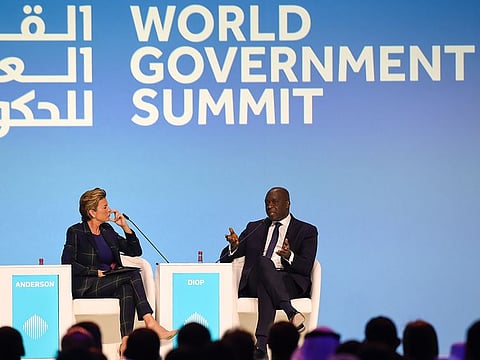WGS 2023: World Bank’s IFC, Abu Dhabi fund to invest $1.5 billion in emerging market energy transition
$9 trillion is needed yearly for global economies to transition to clean energy sources

The World Bank’s International Finance Corporation (IFC) investment arm will sign an agreement with the Abu Dhabi Fund for Development on a joint $1.5 billion investment in emerging markets’ energy transition, the IFC chief said at the World Government Summit in Dubai on Monday.
“I’m signing today with the Abu Dhabi Development Fund a platform for $1.5 billion where we are co-investing with them in emerging markets around energy transition,” said IFC Director General Makhtar Diop said.
However, he did not provide any additional details. The IFC is the largest global development institution focused on private sector investments for emerging markets. The world’s energy and climate future increasingly hinge on decisions made in emerging and developing economies, including least-developed and middle-income economies in Asia, Africa, the Middle East and Latin America.
According to some estimates, as much as $9 trillion is needed yearly for global economies to transition to clean energy sources. And as much as 60 per cent of those investment needs are in emerging economies.
Diop said: “The IMF has said the world doesn’t have a problem managing resources; we have a problem managing resources to make sure we are using renewable energy, but also we have a problem managing existing liquidity towards public investments.”
Diop said the IFC estimates that approximately $1 trillion per year is needed today to assist emerging markets in transitioning their energy needs. He added: “What is missing is bankable projects and the ability for the private sector to assess the risk properly.”
The IFC chief said catastrophic events such as the Russia-Ukraine war and the Turkey-Syria earthquake are making it more difficult for investors to make the right decision. However, the IFC is creating a mechanism to bring a set of bankable projects on a platform and provide simplified procedures to make it attractive to the private sector.
The financial institution is also adopting a warehousing’ system, where bankable projects with ‘green potential’ are presented to capital markets. “We are de-risking these investments and allowing investors to invest in alternative assets connected with green energy,” he added.
Diop also commented on the role technology will play in the transition process: “If you think of all the technological advancements we have today, and if we adopt them, we can better understand the risks we have to process. We talk a lot about the energy transition. However, one of the big challenges we will face shortly is access to water. We need to discuss technology and AI to understand how water can be used more efficiently and in a better manner,” stated Diop.
Sign up for the Daily Briefing
Get the latest news and updates straight to your inbox



